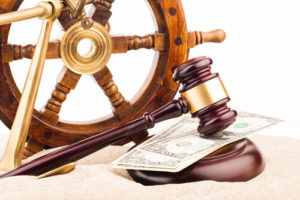Maritime accident cases often require an in-depth understanding of complex federal and state regulations, as well as international treaties and insurance law. At Seerden Law Firm, PLLC, our Houston maritime injury lawyer has extensive experience handling these types of claims. Firm founder Andrew Seerden is a board-certified personal injury trial lawyer who started his career working for insurance companies. He will look at your maritime accident case from every angle and craft a personalized strategy for moving forward.
Contact Seerden Law Firm, PLLC, today to schedule a free consultation about your maritime injury case. We will take the time to sit down with you and answer all your questions.
What You Need to Know About Maritime Law
Admiralty and maritime laws are very complicated, but the easiest way to think of a maritime injury is in terms of where the injury happened and your relationship to the ship.
- Injuries on land. If you are not an employee and are not on the job but are injured on dry land, then the laws of Texas will apply in most cases – unless you are injured by a federal government employee or agency. If you are a worker and get hurt on the job on dry land, then Texas workers’ compensation laws will generally apply to your case.
- Injuries in the harbor. If you are a visitor, guest, or other individual who was not on the job, then typical Texas personal injury laws will likely apply. If, on the other hand, you are a longshoreman or harbor worker, there’s a good chance that the Longshore and Harbor Workers’ Compensation Act may apply. This is a specific law that compensates longshoremen for their injuries while performing official duties in U.S. harbors.
- Injuries in navigable waters. If you are injured offshore in the Gulf of Mexico or in other navigable waters, then you may be entitled to compensation under the Jones Act. This is a federal admiralty law designed to compensate people who are injured aboard U.S. flagged vessels.
The Merchant Marine Act of 1920 (The Jones Act)
The Merchant Marine Act of 1920 (aka Jones Act) was written to resolve a host of problems with international shipping. One of the issues it resolved was giving seamen a chance to recover compensation for injuries while performing their duties offshore.
Not everyone aboard a vessel will be considered a seaman. Though the nearly 100-year-old law does not clearly define a “seaman,” federal courts have helped to set forth the defining characteristics that allow a ship’s crew members to be entitled to compensation for injuries under the Jones Act:
- First, the crew member must have some significant role in the function of operating the vessel and achieving the purported mission.
- Second, the crew member must have some direct and substantial connection to a ship that is being navigated.
- Finally, some courts have clarified that when less than 30 percent of the worker’s time is spent contributing to the vessel’s operation, the worker is not considered a seaman.
Each case is unique, but some examples are more obvious than others. For instance, a mechanic who spends practically all working hours making functional repairs to a ship will generally be considered a seaman. An entertainer who performs almost no functional tasks in furtherance of the vessel’s operation will usually not be considered a seaman.
For those who qualify under the Jones Act, compensation can include:
- Payment for medical expenses
- Money for lost income
- Maintenance and cure (money to help pay your bills and cover medical costs while you are recovering)
Longshoremen & Harbor Workers’ Compensation Act
This law is designed to protect those who perform crucial shipping and harbor duties in America’s shipping ports. Houston is close to some of the largest ports of entry in the country. Longshoremen are frequently injured, as the job entails a lot of intrinsic dangers, such as working around heavy shipping containers, cranes, and moving equipment.
Typical injuries include:
- Back/disc injuries
- Skull traumas
- Piercing injuries
- Death
Common harbor accidents tend to include problems like:
- Shipping containers breaking loose from cranes
- Inexperienced or poorly trained crane operators
- Shifting or loose containers
- Auto accidents in or around the harbor
- Forklift injuries
- Serious falls from heights
- Flying or falling debris
- Power tool accidents
- Heavy equipment accidents
After a longshoreman injury, a number of compensation types may be available. As an injured harbor worker, you might be able to recover:
- Disability payments (permanent or temporary)
- Money to help with medical bills
- Cash to pay for transportation to and from medical appointments
- The cost of rehab, physical therapy, or other necessary treatment due to the injury
It is crucial to speak with a knowledgeable maritime accident lawyer as soon as possible after an injury to learn about your legal rights. Schedule a free consultation with our team today.
Death on the High Seas Act
Some injuries end up being fatal. When a person dies on the high seas, there are options for family members to recover compensation under federal law. The Death on the High Seas Act (DOHSA) operates much like the Texas Wrongful Death Act. Compensation can include:
- Final expenses (burial / funeral costs)
- Loss of support and financial assistance
- Loss of care and companionship
- Pain and suffering
- Final medical costs
Limitation of Liability Act
The Shipowners Limitation of Liability Act of 1851 is an age-old admiralty law that is actually designed to protect ship owners from direct liability from passenger claims and crew member claims. Under this old yet still valid law, a vessel’s owner can use the law to attempt to limit liability. This can be done two ways:
- Defensive limitation of liability. A ship owner who is sued for the injuries or death of a crew member or passenger may assert this statute as a defense in an effort to reduce potential liability.
- Offensive limitation of liability. A vessel owner can also assert this statute by filing a federal petition even before being sued for injuries or death.
While this law does pose a potential challenge to those who would seek compensation, there are exceptions that often apply. For instance, a vessel owner has just six months from the date of receiving notice of a claim by an injured party to take action. If the defense or petition is not filed in that time, the vessel owner waives this defense. Also, in general, the claim must be one that likely exceeds the value of the vessel.
Other unique and nuanced exceptions exist, so if you are facing a serious injury, you don’t have a lot of time to wait. You need to speak to an experienced Houston maritime injury lawyer as soon as possible to protect your interests.
Your Rights After a Maritime Accident
If you are injured in an offshore or harbor accident, you should know your legal rights:
- You do not have to speak with an insurance adjuster or representative from your employer right away.
- You should speak to your own personal injury attorney first and get the facts.
- Even if you have a wonderful employer who you trust and believe will do the right thing, you don’t know the insurance company. Chances are the insurance company will move quickly to conceal or even destroy crucial evidence. The insurance company will be rapidly investigating the accident, talking to witnesses, and looking for ways to limit liability.
The unfortunate reality is: Insurance companies are not on your side. But at Seerden Law Firm, PLLC, we are. Our primary focus is helping injured people recover money for their injuries so that they can move on with their lives. This is often a very challenging task, even for experienced attorneys. The last thing you want to do is put your future in jeopardy. Let a board-certified personal injury trial lawyer help with your case now.
Common Types of Maritime Accidents
There are myriads of ways that a seaman can be injured at sea. Depending on the job, injuries can happen above deck, below deck, and even in relatively safe-sounding jobs. Once a ship is on the open seas, just about anything can happen. In the Houston area, common injuries tend to involve shipping vessels and offshore oil rig injuries. Accidents can include:
- Explosions
- Drowning
- Fires
- Falls
- Falling and flying debris
- Falls overboard
How Long Do You Have to File a Claim After a Maritime Accident?
There are a lot of different statutes of limitations for maritime injury cases. It all depends on the nature of the case and the law that applies. Here is a brief summary of the deadlines that apply to most cases. Just keep in mind that no matter what the general rule allows, there are always exceptions that can lengthen or shorten the deadline. Therefore, you should always speak with an experienced maritime injury attorney as early as possible.
- Jones Act – 3 years from the date of injury
- Longshore and Harbor Workers’ Compensation Act – 1 year from injury
- Death on the High Seas Act – 3 years from death
There are a few important qualifications you should consider, however. If your injuries were caused by a government entity, you may need to file a notice of your claim with the federal agency responsible in as little as six months and file suit within two years. If a local municipal agency is responsible, you could have as little as six months to file a lawsuit. If a foreign vessel is involved in causing your injuries, an international treaty may require different actions and offer even less time for seeking compensation.
For these reasons, it always makes sense to speak with an attorney fast. At Seerden Law Firm, PLLC, we always offer free consultations for injured maritime workers. This way you can get information and make an educated decision about how to proceed without incurring any out-of-pocket expenses. In fact, we only charge an attorney fee if we actually help you recover compensation for your injuries.
How a Houston Jones Act Lawyer Can Help with Your Case
When you contact Seerden Law Firm, PLLC, you will speak to a Houston maritime accident attorney who can provide free and confidential advice during an initial consultation. This might help give you the confidence to move forward with your claim.
Next, your attorney will begin investigating the accident, collecting evidence, and interviewing witnesses, as well as helping to coordinate care so that you receive the medical treatment you need and deserve. Our law firm will aggressively negotiate with insurance representatives in order to demand full compensation for your injury.
Please give us a call today to schedule your free consultation, and learn how we can help you.






